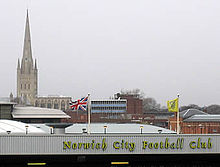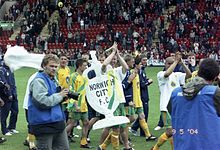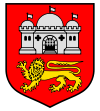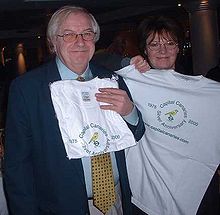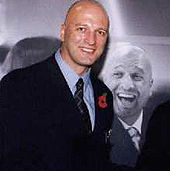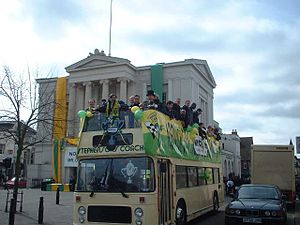- Norwich City F.C.
-
Norwich City 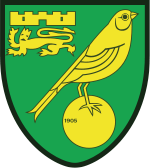
Full name Norwich City Football Club Nickname(s) The Canaries Founded 17 June 1902[1] Ground Carrow Road,
Norwich
(Capacity: 27,033)Chairman Alan Bowkett Manager Paul Lambert League Premier League 2010–11 Championship, 2nd
(promoted)Home coloursAway colours Current season
Current seasonNorwich City Football Club is an English professional football club based in Norwich, Norfolk. As of the 2011–12 season, Norwich City are again playing in the Premier League after a six-year absence, having finished as runner up in the Championship in 2010–11 and winning automatic promotion.[2]
The club was founded in 1902. They first won promotion to the Football League First Division in 1972, and have played a total of 21 seasons in the top flight, with a longest continuous spell of nine seasons. Norwich have won the League Cup twice, in 1962 and 1985. They were founder members of the Premier League in 1992–93, finishing third in the inaugural season and played in its first three seasons, reaching the UEFA Cup 3rd Round, returning for one season in 2004–05.
Since 1935, Norwich have played their home games at Carrow Road and have a long-standing and fierce rivalry with East Anglian neighbours Ipswich Town, with whom they have contested the East Anglian derby 138 times. The fans' song "On The Ball, City" is regarded as being the oldest football song in the world.
Contents
History
Norwich City F.C. was formed following a meeting at the Criterion Cafe in Norwich on 17 June 1902 and then a sub meeting occurred on 2 July 1902 by a group of friends led by three former Norwich CEYMS players, Robert Webster, Joseph Cowper and Brad Skelly,[1][3] and played their first competitive match against Harwich & Parkeston, at Newmarket Road on 6 September 1902.[4] Following a FA Commission, the club was ousted from the amateur game in 1905, deemed a professional organisation. Later that year Norwich were elected to play in the Southern League and with increasing crowds, they were forced to leave Newmarket Road in 1908, moving to The Nest, a disused chalk pit. The club's original nickname was the Citizens, although this was superseded by 1907 by the more familiar Canaries.This was because the breeding and keeping of the birds was popular at this time. During the First World War, with football suspended and facing spiralling debts, City went into voluntary liquidation on 10 December 1917.[5]
The club was officially reformed on 15 February 1919 – a key figure in the events was a Mr C Watling, father of future club Chairman, Geoffrey Watling.[6] and when, in May 1920, The Football League formed a third Division, Norwich joined the Third Division for the following season.[7] Their first league fixture, against Plymouth Argyle, on 28 August 1920, ended in a 1–1 draw. The club went on to endure a mediocre decade, finishing no higher than eighth but no lower than 18th.[5] The following decade proved more successful for the club with a club-record victory, 10–2, over Coventry City and promotion as champions to the Second Division in the 1933–34 season under the management of Tom Parker.[8] With crowds continuing to rise, and with the Football Association raising concerns over the suitability of The Nest, the club considered renovation of the ground, but ultimately decided on a move to Carrow Road. The inaugural match, held on 31 August 1935, against West Ham United, ended in a 4–3 victory to the home team and set a new record attendance of 29,779. The biggest highlight of the following four seasons was the visit of King George VI to Carrow Road on 29 October 1938. However, the club was relegated to the Third Division at the end of the season.[9] The league was suspended the following season as a result of the outbreak of the Second World War and did not resume until the 1946–47 season.[5] City finished this and the following season in 21st place,[10][11] the poor results forcing the club to apply for re-election to the league.[12] The club narrowly missed out on promotion under the guidance of manager Norman Low in the early 1950s, but following the return of Tom Parker as manager, Norwich finished bottom of the football league in the 1956–57 season.[13]
The 1958–59 season saw Norwich reach the semi-final of the FA Cup as a Third Division side, defeating two First Division sides on the way: Tottenham Hotspur and Matt Busby's Manchester United.[12][14] In the 1959–60 season, Norwich were promoted to the Second Division after finishing second to Southampton, and achieved a fourth place finish in the 1960–61 season.[12] In 1962 Ron Ashman guided Norwich to their first trophy, defeating Rochdale 4–0 on aggregate in a two-legged final to win the League Cup.[15]
Sixth place in the league was the closest the club came to promotion to the First Division during the 1960s, but after winning the division in the 1971–72 season under manager Ron Saunders, Norwich City reached the highest level of English football for the first time.[16] They made their first appearance at Wembley Stadium in 1973, losing the League Cup final 1–0 to Tottenham Hotspur.[17] Relegation to the Second Division in 1974 resulted in the resignation of Saunders and the appointment of John Bond.[16] A highly successful first season saw promotion back to the First Division and another visit to Wembley, again in the League Cup final, this time losing 1–0 to Aston Villa.[18] Bond resigned during the 1980–81 season and the club were relegated, but bounced back the following season after finishing third.[19]
The 1984–85 season was of mixed fortunes for the club; under Ken Brown's guidance, they reached the final of the Milk Cup at Wembley Stadium, having defeated Ipswich Town in the semi-final. In the final, they beat Sunderland 1–0, but in the league both Norwich and Sunderland were relegated to the second tier of English football. This made Norwich the first English club to win a major trophy and suffer relegation in the same season; something which was not matched until Birmingham City also suffered relegation the season they won the League Cup 26 years later.
Norwich were also denied their first foray into Europe with the ban on English clubs after the Heysel Stadium disaster.[20][21] City bounced back to the top flight by winning the Second Division championship in the 1985–86 season.[22] High league placings in the First Division in 1986–87 and 1988–89 would have been enough for UEFA Cup qualification, but the ban on English clubs remained.[21] They also had good cup runs during his period, reaching the FA Cup semi-finals in 1989 and again in 1992.[23][24]
During 1992–93, the inaugural season of the Premier League, Norwich City led the league for most of the season,[25] before faltering in the final weeks to finish third behind the champions, Manchester United, and Aston Villa.[26] The following season Norwich played in the UEFA Cup for the first time, losing in the third round to Inter Milan, but defeating Bayern Munich. Winning 2–1, Norwich are the only English team to beat Bayern Munich in the Olympic Stadium.[27] Mike Walker quit as Norwich City manager in January 1994,[28] to take charge of Everton and was replaced by 36-year-old first team coach John Deehan who led the club to 12th place in the 1993–94 season in the Premier League.[29] The club were relegated to the First Division the following season.[30] Shortly before relegation, Deehan resigned as manager and his assistant Gary Megson took over until the end of the season.[31] Martin O'Neill, who had taken Wycombe Wanderers from the Conference to the Second Division with successive promotions, was appointed as Norwich City manager in the summer of 1995.[32] He lasted just six months in the job before resigning after a dispute with chairman Robert Chase over money to strengthen the squad.[33] Soon after, Chase stepped down after protests from supporters, who complained that he kept selling the club's best players and was to blame for their relegation.[34] Chase's majority stakeholding was bought by Geoffrey Watling.[35]
English television cook Delia Smith and husband Michael Wynn-Jones took over the majority of Norwich City's shares from Watling in 1996,[35] and Mike Walker was re-appointed as the club's manager.[36] He was unable to repeat the success achieved during his first spell and was sacked two seasons later with Norwich mid-table in the First Division.[37] Nigel Worthington took over as Norwich City manager in December 2000 following an unsuccessful two years for the club under Bruce Rioch and then Bryan Hamilton. He had been on the coaching staff under Hamilton who resigned with the club 20th in the First Division and in real danger of relegation to the third tier of English football for the first time since the 1960s.[38] Worthington avoided the threat of relegation and, the following season, led City to a playoff final at the Millennium Stadium, which Norwich lost against Birmingham City on penalties.[39]
The 2003–04 campaign saw the club win the First Division title, finishing eight points clear of second-placed West Bromwich Albion and returned to the top flight for the first time since 1995.[40] For much of the 2004–05 season however, the club struggled and, despite beating Manchester United 2–0 and Newcastle United 2–1 towards the end of the season,[41] a last day 6–0 defeat away to Fulham condemned them to relegation.[42] A mediocre season followed in The Championship as the club finished in ninth despite hopes of bouncing straight back up to the top flight,[43] and as results in the 2006–07 season went against City, the pressure mounted on manager Nigel Worthington, culminating with his sacking on 1 October 2006, directly after a 4–1 defeat at the hands of Championship rivals Burnley.[44] On 16 October 2006, Norwich held a press conference to reveal that former City player Peter Grant had left West Ham United to become the new manager,[45] and in February 2007, Grant replaced assistant Doug Livermore with his fellow Scot, Jim Duffy. [46] Grant's side struggled for most of the season and worse was to follow. Norwich made a terrible start to the 2007–08 season, with only two wins by mid October; following a 1–0 defeat at fellow-strugglers Queens Park Rangers, Peter Grant left the club by "mutual consent" on 9 October 2007.[47] On 30 October 2007, former Newcastle United manager Glenn Roeder was confirmed as Grant's replacement.[48] Roeder, hired with the goal to keep Norwich in the Championship, managed to do so with a 3–0 win over Queens Park Rangers, Norwich's penultimate game of the season.
In the early afternoon of 14 January 2009 it was announced that Roeder had been relieved of his first team duties after 60 games in charge, and just 20 victories.[49] A week later, Bryan Gunn was appointed as manager until the end of the season,[50] but he was unable to prevent the club from being relegated on 3 May 2009, after a 4–2 defeat away at already relegated, Charlton Athletic.[51] Following their relegation, their first game of the season resulted in a shock 7–1 home defeat against East Anglian rivals Colchester United. This was the club's heaviest ever home defeat, succeeding a record that had stood since 1946. Two fans entered the pitch and ripped up their season tickets after just 22 minutes when the team were already 4–0 down,[52] and Gunn was sacked six days later.[53]
On 18 August 2009 Paul Lambert was announced as the new manager, leaving his post at Colchester, and nine months later led Norwich to promotion back to the Championship as League One Champions, after a single season in League One.[54][55] The following season saw Norwich promoted to the Premier League, finishing second in the table behind QPR and completing the first back-to-back promotions from the 3rd tier to the 1st since Manchester City in 2000.[56]
Colours and crest
Norwich City's nickname, "The Canaries", has long influenced the team's colours and crest. Originally, the club was nicknamed the Citizens ("Cits" for short), and played in light blue and white halved shirts,[5] although the halves were inconsistent; "the blue was sometimes on the left hand side of the shirt and sometimes on the right."[57] The earliest known recorded link between the club and canaries, comes in an interview recorded in the Eastern Daily Press with newly appointed manager, John Bowman in April 1905. The paper quotes him saying "Well I knew of the City's existence... I have... heard of the canaries."[58] "This as far as we can tell is the first time that the popular pastime of the day ie... rearing... canaries was linked with Norwich City FC... the club still played in blue and white, and would continue to do so for another two seasons."[58] But the city of Norwich had long connections with canaries owing to its 15th and 16th century links to Flemish weavers who had imported the birds to the Low Countries from the Dutch colonies in the Caribbean.
By February 1907, the nickname Canaries had come more into vogue; thoughts that an FA Cup tie against West Bromwich Albion (nicknamed "Throstles" after a bird) was "a bird -singing contest" were dismissed by the polymath C.B. Fry as "humbug" but Bowman and Fry's colleagues in the national press increasingly referred to the team as Canaries.[59]
The following season, to match the nickname, City played for the first time in Canary livery; "yellow shirts with green collars and cuffs. One paper produced the quote 'The Cits are dead but the Canaries are very much alive'."[60] Apart from the obvious colour link, a canary may seem an odd choice; however, many English football clubs have adopted small birds as emblems that symbolise agility and deftness around the field.[61]
While the home colours of yellow and green remain to this day, the away colours have varied since introduction; the away kit is currently green shirts, white shorts and green socks.[62]
A simple canary badge was first adopted in 1922.[63] The current club badge consists of a canary resting on a football with a stylised version of the City of Norwich arms in the top left corner.[64] A competition was held to select the badge, with the winning entry designed by local architect Andrew Anderson.
For the club's centenary celebrations in 2002, a special crest was designed. It featured two canaries looking left and right, and a ribbon noting the centenary.[65]
The French Ligue 1 team FC Nantes which was founded 41 years after Norwich City is also nicknamed The Canaries (Les Canaris) and again, like the Norfolk team, also sports a green and yellow home strip. Turkish Süper Lig club Fenerbahçe are also known as The Canaries; they wear a yellow and blue home strip. Japanese J. League club Shonan Bellmare also wore a similar kit in the 1980s, when it was corporate team. Fujita Kogyo S.C. Modena F.C. of Serie B also nicknamed "Canaries".[citation needed]
Stadium
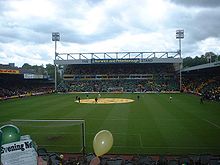 View of the "River End" of Carrow Road, decorated by fans holding fliers distributed by a local newspaper.
View of the "River End" of Carrow Road, decorated by fans holding fliers distributed by a local newspaper.
Norwich City F.C. played at Newmarket Road from 1902 to 1908, with a record attendance of 10,366 against Sheffield Wednesday in a second round FA Cup match in 1908.[66] Following a dispute over the conditions of renting the Newmarket Road ground, in 1908, the club moved to a new home, in a converted disused chalk pit in Rosary Road which became known as "The Nest".[67] By the 1930s, the ground capacity was proving insufficient for the growing crowds and in 1935 the club moved to its current home in Carrow Road.[68] The original stadium, "the largest construction job in the city since the building of Norwich Castle... was "miraculously" built in just 82 days... it was referred to [by club officials] as 'The eighth wonder of the world'"[69][70] An aerial photograph from August 1935 shows three sides of open terracing and a covered stand, with a Colman's Mustard advertisement painted on its roof, visible only from the air.[71] Floodlights were erected at the ground in 1956 whose £9,000 costs nearly sent the club into bankruptcy but the success in the 1959 FA Cup secured the financial status of the club and allowed for a cover to be built over the South Stand, which was itself replaced in 2003 when a new 7,000 seat South stand, subsequently renamed the Jarrold Stand was built in its place.[68]
1963 saw the record attendance for Carrow Road, with a crowd of 43,984 for a 6th round FA Cup match against Leicester City, but in the wake of the Ibrox stadium disaster in 1971, safety licences were required by clubs which resulted in the capacity being drastically reduced to around 20,000. A two-tier terrace was built at the River End and soon after seats began to replace the terraces. By 1979 the stadium had a capacity of 28,392 with seats for 12,675. A fire in 1984 partially destroyed one of the stands which eventually led to its complete demolition and replacement by 1987 of a new City Stand, which chairman Robert Chase described as "Coming to a football match within the City Stand is very much like going to the theatre – the only difference being that our stage is covered with grass".[68] After the Hillsborough disaster in 1989 and the subsequent outcome of the Taylor Report in 1990, the stadium was converted to all-seater with the corners being filled. Today, Carrow Road is an all-seater stadium, with a capacity of just over 27,000.[72]
Supporters
While much of the support that the club enjoys is local, there are a number of exile fan clubs, notably in London and stretching from Scandinavia to countries further afield such as the United Arab Emirates and Hong Kong.[73]
The fans' song, On the Ball, City, is the oldest football song in the world still in use today; the song is in fact older than the club itself having probably been penned for Norwich Teachers or Caley's FC in the 1890s and adapted for Norwich City.[58] Although the first use of the tune and song is disputed, it had been adopted by 1902 and it remains in use today in part if not the whole.[58] The chorus is:[74]
“ Kick off, throw in, have a little scrimmage,
Keep it low, a splendid rush, bravo, win or die;
On the ball City, never mind the danger,
Steady on, now’s your chance,
Hurrah! We’ve scored a goal, City! City! City!” Locally, much is made of the informal title "Pride of Anglia". Fans variously claim the title for either winning the East Anglian Derby, finishing highest in the league, having the better current league position, having the more successful club history or for reasons without any apparent logical basis. The club's main local rival is Ipswich Town. When Norwich and Ipswich meet it is known as the 'East Anglian Derby', or, informally, as the 'Old Farm Derby', a comic reference to the 'Old Firm Derby' played between Scottish teams Celtic and Rangers.[75] Over the 134 matches played against Ipswich since 1902, Ipswich boasts the better record, having won 45% of the matches to Norwich's 37%.[76][i] Another commonly employed measure for "Pride of Anglia", and one that encompasses all of the East Anglian teams is to dub the side finishing as the highest placed East Anglian team in the Football League as the Pride of Anglia.[77][78]
The club is also blessed with a healthy celebrity support with celebrity cook, Delia Smith and comedian Stephen Fry both having moved from fans of the club to running it. Actor Hugh Jackman is also a keen fan of the club, having been taken to Carrow Road as a child by his English mother, though he turned down an opportunity to become an investor in the club in 2010. [79]
Ownership
Norwich City FC is a public limited company that, in 2003, comprised approximately 8,000 individual shareholdings.[80] Since purchasing their shares from Geoffrey Watling, Delia Smith and husband Michael Wynn-Jones have been joint majority shareholders.[35]
At the 2006–07 Norwich City FC Annual General Meeting (on 18 January 2007) Smith and Wynn-Jones announced that they would be open to offers to buy their majority stake-holding in the club. However, they made clear that any prospective buyer would have to invest heavily in the squad, with regards to team improving.[81]
“ The only way we would relinquish our shares is if somebody is going to put money into the football ... Only if they put money into the squad – not if they buy our shares, we don't want money. It has to be that there is money for the squad, serious money for the squad. ” On 8 May 2007 the football club announced that Andrew and Sharon Turner had bought out all 5,000 shares belonging to former Board member, Barry Skipper and had given the club an interest-free loan of £2m. Mr and Mrs Turner are owners and directors of personal finance company Central Trust.
During July 2008 Peter Cullum declared that he was interested in a takeover of the club, and pledged that he would invest £20m for enhancement of the playing squad. On 8 July the EDP reported that Delia Smith and the board had invited Peter Cullum for talks. Reports later stated that the talks had been terminated with immediate effect, and no deal was to be reached.
On 2 September 2008, Andrew and Sharon Turner announced that they were leaving the football club's board of directors. This left a £2 million hole in Norwich City's budget. On 4 September 2008, Delia Smith and Michael Wynn-Jones announced that they would be injecting £2 million, avoiding financial problems for the club.
On the Canaries homepage it was reported that over 500 Norwich City Shareholders attended the Club's Annual General Meeting on January 18. All seven members of the Club Board were present as well as first team manager Paul Lambert. The meeting was opened by Chairman Alan Bowkett and the formal business saw joint majority shareholder Delia Smith and Stephan Phillips re-elected as directors and new director Stephen Fry formerly re-elected having joined the Board last August.[82]
Board members
Position Staff Chairman  Alan Bowkett
Alan BowkettDeputy Chairman  Michael Foulger
Michael FoulgerJoint Majority Shareholder  Delia Smith
Delia SmithJoint Majority Shareholder  Michael Wynn-Jones
Michael Wynn-JonesDirector  Stephen Fry
Stephen FryDirector  Stephan Phillips
Stephan PhillipsDirector (and Chief Executive)  David McNally
David McNallyLast updated: 17 January 2011
Source: Norwich FCStatistics and records
Ron Ashman holds the record for Norwich appearances, having played 592 first-team matches between 1947 and 1964. Ralph Hunt holds the record for the most goals scored in a season, 31 in the 1955–56 season in Division Three (South), with Johnny Gavin the top scorer over a career – 122 between 1948 and 1955. Mark Bowen holds the club record for most international caps, with 35 for Wales.[83]
The club's widest victory margin in the league was their 10–2 win against Coventry City in the Division Three (South) in 1930. Their heaviest defeat in the league was 10–2 against Swindon Town in 1908 in the Southern Football League.
Norwich's record home attendance is 43,984 for a sixth round FA Cup match against Leicester City on 30 March 1963. With the introduction of regulations enforcing all-seater stadiums, it is unlikely that this record will be beaten in the foreseeable future.
The highest transfer fee received for an Norwich player is £7.25 million, from West Ham United for Dean Ashton in January 2006, while the most spent by the club on a player was £3.5 million for Robert Earnshaw from West Bromwich Albion in the same month.[84]
The club's highest league finish was third in the FA Premier League in 1992–93.[72] The club has won the League Cup twice (most recently in 1985) and reached the FA Cup semi-final three times, most recently in 1992.[72] Norwich have taken part in European competition just once, reaching the third round of the UEFA Cup in 1993–94 and are the only British side to beat Bayern Munich in the Olympic Stadium.[25]
Club sponsors
Seasons Sponsor[85] Kit Manufacturers 1975-1976 None Umbro 1976-1981 None Admiral 1981-1983 None Adidas 1983–1986 Poll Withey Windows/ Poll Withey Adidas till 1984, Hummel from 1984 1986–1989 Foster's Lager Hummel (till 1987), Scoreline (till 1989) 1989–1992 Asics Asics 1992–1997 Norwich and Peterborough Building Society Ribero till 1994, Mitre 1997–2001 Colman's Pony (1997-1998), Alexandra Plc (1998-2001) 2001–2003 Digital Phone Company Xara 2003–2006 Proton Cars/Lotus Cars Xara 2006–2008 Flybe.com Xara 2008– Norwich Union/Aviva Xara (2008-2011), Erreà (2011-) Between 2006 and 2008 the club were sponsored by airline Flybe but on 26 April 2008, it was announced that they were stepping down as the main sponsors.[86] On 29 April 2008 it was announced that Aviva would be the new shirt sponsors having signed a three year contract. Aviva are the parent company of Norwich Union.[87]
Players
Current squad
Note: Flags indicate national team as has been defined under FIFA eligibility rules. Players may hold more than one non-FIFA nationality.
No. Position Player 1 
GK John Ruddy 2 
DF Russell Martin 3 
DF Adam Drury 4 
MF Bradley Johnson 5 
FW Steve Morison 6 
DF Zak Whitbread 7 
MF Andrew Crofts 8 
FW James Vaughan 9 
FW Grant Holt (captain) 10 
FW Simeon Jackson 11 
MF Andrew Surman 12 
MF Anthony Pilkington 13 
GK Declan Rudd 14 
MF Wes Hoolahan 15 
MF David Fox No. Position Player 17 
MF Elliott Bennett 18 
MF Korey Smith 19 
MF Simon Lappin 20 
DF Leon Barnett 21 
FW Aaron Wilbraham 22 
DF Elliott Ward 23 
DF Marc Tierney 24 
DF Ritchie De Laet (on loan from Manchester United) 25 
DF Kyle Naughton (on loan from Tottenham Hotspur) 26 
DF Daniel Ayala 28 
DF George Francomb 30 
MF Matt Ball 31 
GK Jed Steer Out on loan
Note: Flags indicate national team as has been defined under FIFA eligibility rules. Players may hold more than one non-FIFA nationality.
No. Position Player 16 
FW Chris Martin (at Crystal Palace until 3 January 2012) 27 
MF Tom Adeyemi (at Oldham Athletic until 3 January 2012) 29 
MF Josh Dawkin (at Kettering Town) 
FW Oli Johnson (at Yeovil Town until 28 December 2011) Notable players
- Past (and present) players who are the subjects of Wikipedia articles can be found here
During the club's centenary season, a "Hall of Fame" was created, honouring 100 former players chosen by fan vote and a further 10 players were inducted into the Norwich City Hall of Fame in 2006.
Players of the Year
- For a more detailed list of these winners of the Barry Butler trophy, see Norwich City Players of the Year.
Year Winner 1967  Terry Allcock
Terry Allcock1968  Hugh Curran
Hugh Curran1969  Ken Foggo
Ken Foggo1970  Duncan Forbes
Duncan Forbes1971  Ken Foggo
Ken Foggo1972  Dave Stringer
Dave Stringer1973  Kevin Keelan
Kevin Keelan1974  Kevin Keelan
Kevin Keelan1975  Colin Suggett
Colin Suggett1976  Martin Peters
Martin Peters1977  Martin Peters
Martin Peters1978  John Ryan
John RyanYear Winner 1979  Tony Powell
Tony Powell1980  Kevin Bond
Kevin Bond1981  Joe Royle
Joe Royle1982  Greg Downs
Greg Downs1983  Dave Watson
Dave Watson1984  Chris Woods
Chris Woods1985  Steve Bruce
Steve Bruce1986  Kevin Drinkell
Kevin Drinkell1987  Kevin Drinkell
Kevin Drinkell1988  Bryan Gunn
Bryan Gunn1989  Dale Gordon
Dale Gordon1990  Mark Bowen
Mark BowenYear Winner 1991  Ian Culverhouse
Ian Culverhouse1992  Robert Fleck
Robert Fleck1993  Bryan Gunn
Bryan Gunn1994  Chris Sutton
Chris Sutton1995  Jon Newsome
Jon Newsome1996  Spencer Prior
Spencer Prior1997  Darren Eadie
Darren Eadie1998  Matt Jackson
Matt Jackson1999  Iwan Roberts
Iwan Roberts2000  Iwan Roberts
Iwan Roberts2001  Andy Marshall
Andy Marshall2002  Gary Holt
Gary HoltYear Winner 2003  Adam Drury
Adam Drury2004  Craig Fleming
Craig Fleming2005  Darren Huckerby
Darren Huckerby2006  Gary Doherty
Gary Doherty2007  Darren Huckerby
Darren Huckerby2008  Dion Dublin
Dion Dublin2009  Lee Croft
Lee Croft2010  Grant Holt
Grant Holt2011  Grant Holt
Grant Holt2012 2013 2014 Captains
For a list of Norwich City captains, see Norwich City captains
Coaching staff
Position Staff Manager  Paul Lambert
Paul LambertAssistant manager  Ian Culverhouse
Ian CulverhouseFirst Team coach
Reserve Team manager Vacant
VacantHead of Football Operations  Gary Karsa
Gary KarsaGoalkeeping Coach  Jeff Wood
Jeff WoodHead of Strength and Conditioning  Mike Watts
Mike WattsAcademy Sports Scientist  Chris Lorkin
Chris LorkinAcademy Manager  Ricky Martin
Ricky MartinAssistant Academy Manager  Gary Holt
Gary HoltUnder 14s coach  Neil Adams
Neil AdamsPerformance Analyst  Gareth Payne
Gareth PayneHead of Physiotherapy  Neal Reynolds
Neal ReynoldsPhysiotherapist  Stuart Wardle
Stuart WardleClub Doctor  Dr Nick Wilford
Dr Nick WilfordChief Scout  Colin Jackson
Colin JacksonLast updated: 22 March 2011
Source: Norwich FCManagers
- As of 8 May 2011. Only professional, competitive matches are counted.[90]
Name Nat From To G W D L %W John Bowman 
1 August 1905 31 July 1907 78 31 23 24 39.7 James McEwen 
1 August 1907 31 May 1908 43 13 10 20 30.2 Arthur Turner 
1 August 1909 31 May 1910 86 27 22 37 31.4 Bert Stansfield 
1 August 1910 31 May 1915 248 78 75 95 31.5 Major Frank Buckley 
1 August 1919 1 July 1920 43 15 11 17 34.9 Charles O'Hagan 
1 July 1920 1 January 1921 21 4 9 8 19.0 Albert Gosnell 
1 January 1921 28 February 1926 233 59 79 95 25.3 Bert Stansfield 
1 March 1926 1 November 1926 Cecil Potter 
1 November 1926 1 January 1929 101 30 26 45 29.7 James Kerr 
1 April 1929 28 February 1933 168 65 43 60 38.7 Tom Parker 
1 March 1933
1 May 19551 February 1937
31 March 1957271 104 69 98 38.4 Bob Young 
1 February 1937
1 September 193931 December 1938
31 May 194678 26 14 38 33.3 Jimmy Jewell 
1 January 1939 1 September 1939 20 6 4 10 30.0 Duggie Lochhead 
1 December 1945 1 March 1950 104 42 28 34 40.4 Cyril Spiers 
1 June 1946 1 December 1947 65 15 12 38 23.1 Norman Low 
1 May 1950 30 April 1955 258 129 56 73 50.0 Archie Macaulay 
1 April 1957 1 October 1961 224 105 60 59 46.9 Willie Reid 
1 December 1961 1 May 1962 31 13 6 12 41.9 George Swindin 
1 May 1962 30 November 1962 20 10 5 5 50.0 Ron Ashman 
1 December 1962 31 May 1966 162 59 39 64 36.4 Lol Morgan 
1 June 1966 1 May 1969 127 45 47 35 35.4 Ron Saunders 
1 July 1969 16 November 1973 221 84 61 76 38.0 John Bond 
27 November 1973 31 October 1980 340 105 114 121 30.9 Ken Brown 
1 November 1980 9 November 1987 367 150 93 124 40.9 Dave Stringer 
9 November 1987 1 May 1992 229 89 58 82 38.9 Mike Walker 
1 June 1992
21 June 19966 January 1994
30 April 1998179 69 46 64 38.5 John Deehan 
12 January 1994 31 July 1995 58 13 22 23 22.4 Martin O'Neill 
August 1995 December 1995 26 12 9 5 46.2 Gary Megson 
December 1995 21 June 1996 32 5 10 17 15.6 Bruce Rioch 
12 June 1998 13 March 2000 93 30 31 32 32.3 Bryan Hamilton 
5 April 2000 4 December 2000 35 10 10 15 28.6 Nigel Worthington 
4 December 2000 2 October 2006 280 114 104 62 40.7 Peter Grant 
13 October 2006 9 October 2007 54 18 12 24 33.3 Glenn Roeder 
30 October 2007 14 January 2009 65 20 15 30 30.8 Bryan Gunn 
16 January 2009 13 August 2009 21 6 5 10 28.6 Paul Lambert 
18 August 2009 Present 100 56 25 19 56.0 Honours
Norwich City have won a number of honours, including the following:[91]
League
Football League First Division (level 1)
- 3rd placed (1) (1992–93)
Football League Second Division (Level 2)
Football League Third Division (Level 3)
Cup
- Friendship Trophy
Each time they meet, Norwich and Sunderland contest the Friendship Trophy, an honour dating back to the camaraderie forged between fans of the two clubs at the time of the 1985 League Cup final that they contested.[92] Norwich are the current holders of the cup, having defeated Sunderland 2–1 on 26 September 2011, in the Premier League.
In popular culture
In the 2001 film Mike Bassett: England Manager,[93] the eponymous hero, played by Ricky Tomlinson, rises to prominence as a result of success as manager of Norwich City, having won the 'Mr Clutch Cup'. The celebratory scenes of the open-top bus ride around the city (right) were actually shot in St Albans, Hertfordshire, rather than Norwich.
In 1972 the Children's Film Foundation released a movie called "The Boy Who Turned Yellow", about a boy living in London who supports Norwich City. In the film, he and everyone and everything else on his tube train are turned yellow. That night he is visited by a yellow alien called Nick, short for electronic, who teaches him all about electricity. The link to the football club is used to explain why the boy already has so many yellow things in his bedroom.[94]
In 1997, the film version of Nick Hornby's book Fever Pitch told of the 1988–89 season, in which Norwich City, still in contention for the league title on 1 May, when games were resumed following the Hillsborough disaster, played at Arsenal, the favourite club of the film's protagonist, Paul Ashworth (Colin Firth). Notoriously pessimistic about Arsenal's chances despite their current first-place status, Paul says, "I want us to win. And I think we will." His friend Steve (Mark Strong) says, "Well, that's new. Home to Norwich, you'd usually be predicting, what, a 2–0 defeat? Nil–nil, maybe, if you was really on top of the world?" But, buoyed by several strokes of good luck (and by Hornby, also the film's scriptwriter, having the benefit of hindsight), Paul predicts a 5–0 victory, which turns to be the exact score, knocking Norwich out of the race, in which they finished fourth, their best first-division finish until the 1992–93 season.
On 28 February 2005, majority shareholder Delia Smith put Norwich into the limelight at half-time during a televised home match against Manchester City. With relegation from the Premier League looking likely, Delia took hold of the microphone and in an effort to rally the crowd, shouted “A message for the best football supporters in the world: We need a 12th man here. Where are you? Where are you? Let’s be having you! Come on!”[95][96][97][98] and clips of the Sky Sports coverage were hosted by YouTube.[99]
Notes
- i^ : This includes matches played at an amateur level.
References
- ^ a b "Norwich City History". 4thegame.com. http://www.4thegame.com/club/norwich-city-fc/history/. Retrieved 10 June 2007.
- ^ Portsmouth 0–1 Norwich, BBC Sport website. Retrieved 2 May 2011.
- ^ Club history 1902 to 1940 Norwich City FC
- ^ Eastwood, John; Mike Davage (1986). Canary Citizens. Almeida Books. pp. 1, p19. ISBN 0-7117-2020-7.
- ^ a b c d "History – 1902/1940". Norwich City FC. http://www.canaries.co.uk/page/History/0,,10355~1023784,00.html. Retrieved 26 March 2007.
- ^ Eastwood. Canary Citizens. p. 46.
- ^ Eastwood. Canary Citizens. p. 47.
- ^ "Final 1933/1934 English Division 3 South Table". Soccerbase. http://www.soccerbase.com/league2.sd?teamid=1855&seasonid=63. Retrieved 29 March 2007.
- ^ "Final 1938/1939 English Division 2 (old) Table". Soccerbase. http://www.soccerbase.com/league2.sd?teamid=1855&seasonid=68. Retrieved 29 March 2007.
- ^ "Final 1946/1947 English Division 3 South Table". Soccerbase. http://www.soccerbase.com/league2.sd?teamid=1855&seasonid=76. Retrieved 29 March 2007.
- ^ "Final 1947/1948 English Division 3 South Table". Soccerbase. http://www.soccerbase.com/league2.sd?teamid=1855&seasonid=77. Retrieved 29 March 2007.
- ^ a b c "History – 1941/1969". Norwich City FC. http://www.canaries.co.uk/page/History/0,,10355~1025325,00.html. Retrieved 29 March 2007.
- ^ "Final 1956/1957 English Division 3 South Table". Soccerbase. http://www.soccerbase.com/league2.sd?teamid=1855&seasonid=76. Retrieved 29 March 2007.
- ^ "English FA Cup 1958/1959". Soccerbase. http://www.soccerbase.com/cup2.sd?competitionid=58&seasonid=88. Retrieved 26 March 2007.
- ^ "English League Cup 1961/1962". Soccerbase. http://www.soccerbase.com/cup2.sd?competitionid=60&seasonid=91. Retrieved 29 March 2007.
- ^ a b "History – 1970/1985". Norwich City FC. http://www.canaries.co.uk/page/History/0,,10355~1025326,00.html. Retrieved 29 March 2007.
- ^ "English League Cup Final 1972–73". Soccerbase. http://www.soccerbase.com/results3.sd?gameid=259796. Retrieved 26 March 2007.
- ^ "English League Cup Final 1974–75". Soccerbase. http://www.soccerbase.com/results3.sd?gameid=259933. Retrieved 26 March 2007.
- ^ "Final 1981/1982 English Division 2 (old) Table". Soccerbase. http://www.soccerbase.com/league2.sd?teamid=1855&seasonid=111. Retrieved 29 March 2007.
- ^ "English League Cup 1984–85". Soccerbase. http://www.soccerbase.com/cup2.sd?competitionid=60&seasonid=114. Retrieved 26 March 2007.
- ^ a b "History 1986/95". Norwich City FC. http://www.canaries.co.uk/page/History/0,,10355~1025327,00.html. Retrieved 26 March 2007.
- ^ "Final 1985/1986 English Division 2 (old) Table". Soccerbase. http://www.soccerbase.com/league2.sd?competitionid=6&seasonid=115. Retrieved 26 March 2007.
- ^ "English FA Cup 1988/1989". Soccerbase. http://www.soccerbase.com/cup2.sd?competitionid=58&seasonid=118. Retrieved 27 March 2007.
- ^ "English FA Cup 1991/1992". Soccerbase. http://www.soccerbase.com/cup2.sd?competitionid=58&seasonid=121. Retrieved 27 March 2007.
- ^ a b "History 1986/1995". Norwich City FC. http://www.canaries.co.uk/page/History/0,,10355~1025327,00.html. Retrieved 25 March 2007.
- ^ "Final 1992/1993 English Premier Table". Soccerbase. http://www.soccerbase.com/league2.sd?teamid=1855&seasonid=122. Retrieved 27 March 2007.
- ^ "UEFA Cup 1993/1994". Soccerbase. http://www.soccerbase.com/cup2.sd?competitionid=64&seasonid=123. Retrieved 27 March 2007.
- ^ "Walker leaves Norwich City". BBC Sport. 30 April 1998. http://news.bbc.co.uk/2/hi/86316.stm. Retrieved 27 March 2007.
- ^ "Final 1993/1994 English Premier Table". Soccerbase. http://www.soccerbase.com/league2.sd?teamid=1855&seasonid=123. Retrieved 27 March 2007.
- ^ "Final 1994/1995 English Premier Table". Soccerbase. http://www.soccerbase.com/league2.sd?teamid=1855&seasonid=124. Retrieved 27 March 2007.
- ^ "Gary Megson Factfile". BBC Birmingham. 27 October 2004. http://www.bbc.co.uk/birmingham/sport/2004/10/megson_factfile.shtml. Retrieved 27 March 2007.
- ^ "Profile: Martin O'Neill". BBC Sport. 1 May 2002. http://news.bbc.co.uk/sport1/hi/football/scottish_cup/1961921.stm. Retrieved 27 March 2007.
- ^ "Martin O'Neill". BBC Sport. 14 May 2002. http://news.bbc.co.uk/sport3/worldcup2002/hi/tv_radio_coverage/newsid_1987000/1987736.stm. Retrieved 27 March 2007.
- ^ "Canary Centenary". Eastern Daily Press. Archived from the original on 3 April 2007. http://web.archive.org/web/20070403191310/http://www.edp24.co.uk/Content/Sport/CanaryCentenary/1990_2000.asp. Retrieved 23 April 2007.
- ^ a b c "Norwich legend Watling has died". BBC Sport. 17 November 2004. http://news.bbc.co.uk/sport1/hi/football/teams/n/norwich/4020587.stm. Retrieved 27 March 2007.
- ^ "Mike Walker's managerial career". Soccerbase. http://www.soccerbase.com/managers2.sd?managerid=972. Retrieved 28 March 2007.
- ^ "Final 1997/1998 Football League Championship Table". Soccerbase. http://www.soccerbase.com/league2.sd?teamid=1855&seasonid=127. Retrieved 28 March 2007.
- ^ "Worthington handed Norwich chance". BBC Sport. 2 January 2001. http://news.bbc.co.uk/sport2/hi/football/teams/n/norwich/1097980.stm. Retrieved 28 March 2007.
- ^ "Birmingham reach Premiership". BBC Sport. 12 May 2002. http://news.bbc.co.uk/sport2/hi/football/eng_div_1/1979806.stm. Retrieved 28 March 2007.
- ^ "Norwich City win Premiership promotion". BBC Norfolk. http://www.bbc.co.uk/norfolk/funstuff/galleries/norwich_city_promotion/norwich_city_promotion_01.shtml. Retrieved 28 March 2007.
- ^ "Norwich 2004/2005 results and fixtures". Soccerbase. http://www.soccerbase.com/results2.sd?teamid=1855&seasonid=134. Retrieved 28 March 2007.
- ^ "Fulham 6–0 Norwich". BBC Sport. 15 May 2005. http://news.bbc.co.uk/sport2/hi/football/eng_prem/4525103.stm. Retrieved 28 March 2007.
- ^ "Final 2005/2006 Football League Championship Table". Soccerbase. http://www.soccerbase.com/league2.sd?competitionid=2&seasonid=135. Retrieved 28 March 2007.
- ^ "Norwich sack manager Worthington". BBC Sport. 1 October 2006. http://news.bbc.co.uk/sport2/hi/football/teams/n/norwich/5397320.stm. Retrieved 28 March 2007.
- ^ "Grant appointed as Norwich boss". BBC Sport. 16 October 2006. http://news.bbc.co.uk/sport2/hi/football/teams/n/norwich/6049534.stm. Retrieved 28 March 2007.
- ^ "Grant adds to backroom staff". BBC Sport. 12 February 2007. http://news.bbc.co.uk/sport2/hi/football/teams/n/norwich/6342553.stm. Retrieved 28 March 2007.
- ^ "Grant parts company with Canaries". BBC Sport. 9 October 2007. http://news.bbc.co.uk/sport1/hi/football/teams/n/norwich/7035042.stm. Retrieved 30 October 2007.
- ^ "Norwich name Roeder as new boss". BBC Sport. 30 October 2007. http://news.bbc.co.uk/sport1/hi/football/teams/n/norwich/7068855.stm. Retrieved 30 October 2007.
- ^ "Roeder sacked as Norwich manager". BBC Sport. 14 January 2009. http://news.bbc.co.uk/sport1/hi/football/teams/n/norwich/7828617.stm. Retrieved 14 January 2009.
- ^ "Norwich name Gunn boss for season". BBC Sport. 21 January 2009. http://news.bbc.co.uk/sport1/hi/football/teams/n/norwich/7841754.stm. Retrieved 3 May 2009.
- ^ "Norwich drop down to League One". BBC Sport. 3 May 2009. http://news.bbc.co.uk/sport1/hi/football/eng_div_1/8015098.stm. Retrieved 3 May 2009.
- ^ "Norwich 1 – 7 Colchester". BBC Sport. 8 August 2009. http://news.bbc.co.uk/sport1/hi/football/eng_div_2/8186227.stm. Retrieved 9 August 2009.
- ^ "Manager Gunn sacked by Canaries". BBC Sport. 13 August 2009. http://news.bbc.co.uk/sport1/hi/football/teams/n/norwich/8202278.stm. Retrieved 13 August 2009.
- ^ "Charlton 0–1 Norwich". BBC Sport. 17 April 2010. http://news.bbc.co.uk/sport1/hi/football/eng_div_2/8617895.stm. Retrieved 17 April 2010.
- ^ "Norwich 2–0 Gillingham". BBC Sport. 24 April 2010. http://news.bbc.co.uk/sport1/hi/football/eng_div_2/8620715.stm. Retrieved 24 April 2010.
- ^ Portsmouth 0–1 Norwich BBC Sport, 2 May 2011
- ^ Eastwood. Canary Citizens. p. 18.
- ^ a b c d Eastwood. Canary Citizens. p. 24.
- ^ Eastwood. Canary Citizens. pp. 28–29.
- ^ Eastwood. Canary Citizens. p. 29.
- ^ Morris, Desmond (1981). The Soccer Tribe. London: Jonathan Cape. p. 210. ISBN 0-224-01935-X.
- ^ "New away kit 2011–12". Norwich City FC. 25 July 2011. http://www.canaries.talent-sport.co.uk/PagesPublic/ProductBrowse/browse03.aspx?group1=R&group2=A11. Retrieved 25 July 2011.
- ^ "Bridewell trail" (PDF). Norfolk Museums. http://www.museums.norfolk.gov.uk/img/Bridewell%20web%20Trail.pdf. Retrieved 20 April 2007.[dead link]
- ^ Smith, Roger (2004). The Canary Companion. RJS Publishing. p. 39. ISBN 0-9548287-0-4.
- ^ Richard Moss (20 December 2002). "ON THE BALL CITY – 100 YEARS OF NORWICH CITY FOOTBALL CLUB". http://www.culture24.org.uk/places+to+go/east+of+england/norwich/art14471. Retrieved 20 April 2007.
- ^ "Norwich City grounds – 1. Newmarket Road". Eastern Daily Press. Archived from the original on 5 May 2007. http://web.archive.org/web/20070505133045/http://www.edp24.co.uk/Content/Sport/CanaryCentenary/Newmarket.asp. Retrieved 28 March 2007.
- ^ "Norwich City grounds – 2. The Nest". Eastern Daily Press. Archived from the original on 5 May 2007. http://web.archive.org/web/20070505092150/http://www.edp24.co.uk/Content/Sport/CanaryCentenary/Nest.asp. Retrieved 28 March 2007.
- ^ a b c "Norwich City grounds – 3. Carrow Road". Eastern Daily Press. Archived from the original on 5 May 2007. http://web.archive.org/web/20070505125111/http://www.edp24.co.uk/Content/Sport/CanaryCentenary/Carrow.asp. Retrieved 28 March 2007.
- ^ Eastwood. Canary Citizens. p. 63.
- ^ "The highs and lows of City’s rich past". Norwich Evening News. 10 May 2004. Archived from the original on 30 September 2007. http://web.archive.org/web/20070930015607/http://new.eveningnews24.co.uk/content/sport/features/Promotion2004/040510Past.aspx. Retrieved 23 April 2007.
- ^ Eastwood. Canary Citizens. p. 65.
- ^ a b c "Carrow Road". Norwich City FC. http://www.canaries.co.uk/page/CarrowRoad/0,,10355,00.html. Retrieved 28 March 2007.
- ^ "Supporter Groups". Norwich City FC. http://www.canaries.co.uk/page/SupporterGroupsIndex/0,,10355,00.html. Retrieved 23 April 2007.
- ^ "Learn to sing like a canary". BBC. 10 March 2004. http://www.bbc.co.uk/norfolk/sport/norwich_city/song_sheets_words.shtml. Retrieved 23 April 2007.
- ^ Ronald Atkin (19 November 2006). "East Anglia Derby: Grant ready with his shark riposte". The Independent (UK). http://sport.independent.co.uk/football/coca_cola/article1996290.ece. Retrieved 19 March 2007.
- ^ "East Anglian Derby". Ipswich Town FC. http://www.itfc.co.uk/page/ClubHistory/0,,10272~1027174,00.html. Retrieved 16 March 2007.
- ^ Chris Lakey (1 April 2007). "England 2004–05". RSSSF.com. http://www.rsssf.com/engpaul/FLA/2004-05.html. Retrieved 20 April 2007.
- ^ "England 2005–06". RSSSF.com. http://www.rsssf.com/engpaul/FLA/2005-06.html. Retrieved 20 April 2007.
- ^ [1] Jackman on Boxing and why he turned down Norwich
- ^ "The Ownership Structure of Nationwide League Football Clubs 2002–03". football-research.org. http://www.football-research.org/hope/hope-appendix1tables.htm. Retrieved 23 April 2007.[dead link]
- ^ Smith, Delia (19 January 2007). "Delia Smith open to Canaries offers". TEAMtalk.com. http://www.teamtalk.com/football/story/0,16368,1781_1856316,00.html. Retrieved 20 January 2007.
- ^ City, Norwich. http://www.canaries.co.uk/page/NewsDetails/0,,10355~2270580,00.html. Retrieved 27 August 2011.
- ^ "Norwich City all time records". Soccerbase. http://www.soccerbase.com/team_records.sd?teamid=1855. Retrieved 25 April 2007.
- ^ "Norwich City all time records". Soccerbase. http://www.soccerbase.com/team_records.sd?teamid=1855. Retrieved 28 March 2007.
- ^ "Historical Football Kits – Norwich City". http://www.historicalkits.co.uk/Norwich_City/Norwich_City.htm. Retrieved 17 February 2009.
- ^ "Flybe step downs main sponsor". Norwich City FC. http://www.canaries.co.uk/page/NewsDetails/0,,10355~1297089,00.html. Retrieved 28 April 2007.
- ^ "Aviva to sponsor City". Norwich City FC. http://www.canaries.co.uk/page/NewsDetails/0,,10355~1300844,00.html. Retrieved 7 May 2007.[dead link]
- ^ "First Team Profiles". Norwich City F.C.. http://www.canaries.co.uk/page/ProfilesDetail/0,,10355,00.html. Retrieved 27 May 2011.
- ^ "2011–12 Squad Numbers Confirmed". Norwich City F.C.. http://www.canaries.co.uk/page/NewsDetails/0,,10355~2416960,00.html. Retrieved 12 August 2011.
- ^ "So just who was City's top boss?". Eastern Daily Press. Archived from the original on 4 May 2008. http://web.archive.org/web/20080504204315/http://www.edp24.co.uk/Content/Sport/CanaryCentenary/Managers.asp. Retrieved 13 February 2010.
- ^ "Norwich City F.C. History". Norwich City FC. http://www.canaries.co.uk/page/CarrowRoad/0,,10355,00.html. Retrieved 24 April 2007.
- ^ "Up for the cups". Norwich Evening News. 10 May 2004. Archived from the original on 28 September 2007. http://web.archive.org/web/20070928000835/http://www.eveningnews24.co.uk/content/sport/features/Promotion2004/040510Trophies.aspx. Retrieved 13 April 2007.
- ^ "Football film kicks off". BBC News. 26 September 2001. http://news.bbc.co.uk/1/hi/entertainment/film/1564112.stm. Retrieved 28 March 2007.
- ^ Fascinating trivia (and any goofs) connected with the film
- ^ 'Delia's outburst talk of the game' BBC News, 1 March 2005]
- ^ Andrew Levy: 'Had a tad too much cooking sherry, have we, Delia?' Daily Mail, 2 March 2005
- ^ Patrick Barkham. 'The Guardian profile: Delia Smith'. The Guardian. 4 March 2005.
- ^ Brian Viner: 'Delia Smith: Cooking up a storm' The Independent, 5 March 2005
- ^ 'Delia Smith – Where are ya!' www.youtube.com (7 October 2006)
Further reading
- Canary Citizens by Mike Davage, John Eastwood, Kevin Platt, published by Jarrold Publishing, (2001), ISBN 0-7117-2020-7
- Norfolk 'n' Good: A Supporter's View of Norwich City's Best-ever Season by Kevin Baldwin, published by Yellow Bird Publishing, (1993), ISBN 0-9522074-0-0
- Second Coming: Supporter's View of the New Era at Norwich City by Kevin Baldwin, published by Yellow Bird Publishing, (1997), ISBN 0-9522074-1-9
- Norwich City Miscellany by Edward Couzens-Lake, published by Pitch Publishing, (2010), ISBN 1-905411-70-7
External links
Listen to this article (info/dl)
This audio file was created from a revision of Norwich City F.C. dated 16 June 2007, and does not reflect subsequent edits to the article. (Audio help)More spoken articles- Norwich City F.C. on BBC Sport: Club News – Recent results – Upcoming fixtures – Club stats
- NCFC Official Site
- The Pink 'Un
- BBC Norfolk's Norwich City Page
Norwich City Football Club Club Records Players Grounds Other Premier Reserve League South 2011–12 teams Arsenal Reserves · Aston Villa Reserves · Chelsea Reserves · Fulham Reserves · Norwich City Reserves · Swansea City Reserves · West Bromwich Albion Reserves · Wolverhampton Wanderers Reserves ·Original Premier League clubs, 1992–93 Arsenal · Aston Villa · Blackburn Rovers · Chelsea · Coventry City · Crystal Palace · Everton · Ipswich Town · Leeds United · Liverpool · Manchester City · Manchester United · Middlesbrough · Norwich City · Nottingham Forest · Oldham Athletic · Queens Park Rangers · Sheffield United · Sheffield Wednesday · Southampton · Tottenham Hotspur · WimbledonFootball League Championship 2011–12 teams Barnsley · Birmingham City · Blackpool · Brighton & Hove Albion · Bristol City · Burnley · Cardiff City · Coventry City · Crystal Palace · Derby County · Doncaster Rovers · Hull City · Ipswich Town · Leeds United · Leicester City · Middlesbrough · Milwall · Nottingham Forest · Peterborough United · Portsmouth · Reading · Southampton · Watford · West Ham UnitedCompetition Statistics and awards Record · All-time table · Football League Awards · Golden Boot · Macron Golden Glove · Manager of the Month · Player of the Month · Hat-tricksFinances Sponsors Associated competitions Seasons 2004-05 · 2005-06 · 2006-07 · 2007-08 · 2008-09 · 2009-10 · 2010-11 · 2011-12Prospects Categories:- Norwich City F.C.
- Association football clubs established in 1902
- English football clubs
- Football League Cup winners
- Former Football League clubs
- Southern Football League clubs
- Norwich
- Premier League clubs
- Sport in Norfolk
- 1902 establishments in England
Wikimedia Foundation. 2010.

